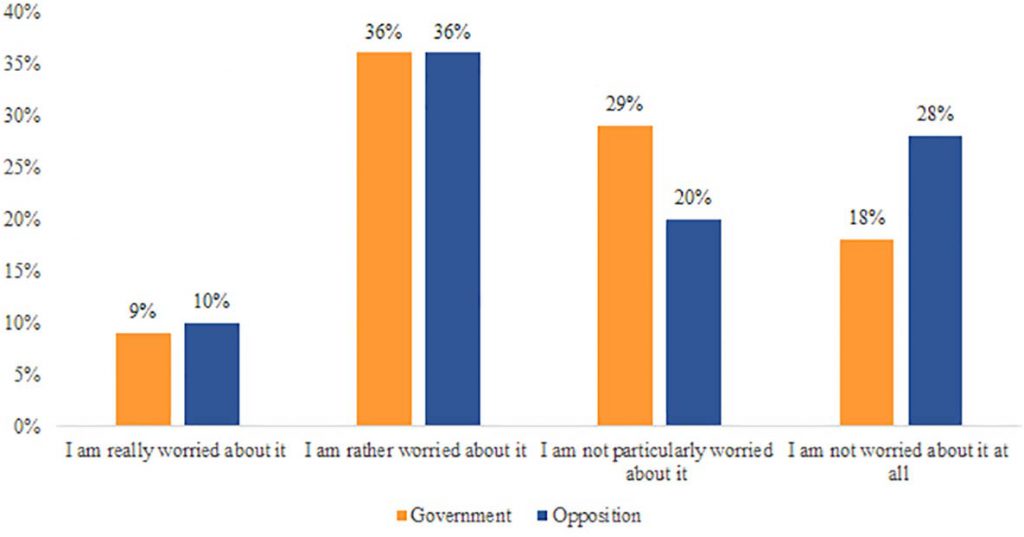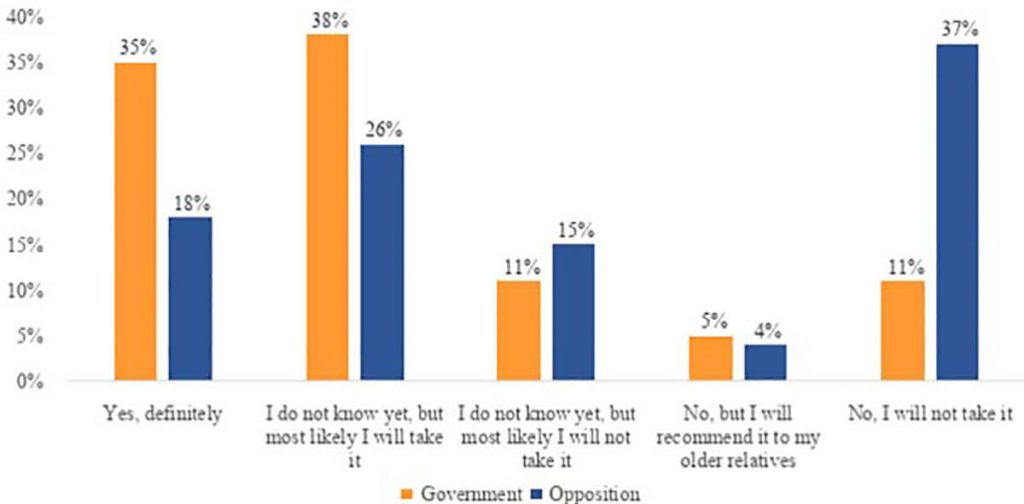Balázs Böcskei and Eszter Farkas analyse the influence of partisan alignment on public health issues related to coronavirus. Their findings suggest that even in highly polarised Hungary, the significance of the pandemic over time is suppressing the influence of party alignment on Covid-related issues
Does partisan alignment influence public attitudes to public health issues during a pandemic? We investigated this question in Hungary, a country which has experienced strong partisan polarisation, and where one would therefore expect the positions of political parties to have a notable impact. Our survey analysed two Covid-related issues. First, we asked whether people are worried about a fourth wave of the pandemic. Second, we wanted to know whether they would take the third vaccine.
In the period since March 2020, the pandemic – despite its public health nature – has escalated into a politicised issue. Research in the US, for example, reveals strong partisan dynamics in perceptions of the threat and seriousness of coronavirus.
research in the US reveals strong partisan dynamics in perceptions of the threat and seriousness of coronavirus
In Hungary, the electorate is starkly polarised between supporters of Viktor Orbán's governing Fidesz party, and anti-Orbán opposition. Differences between these two factions have been growing for years. This polarisation has had a negative effect on Hungary's economic productivity, and on the stability of its democratic institutions.
The results of our recent online survey show that during the first wave of the pandemic, Hungarian people tended to follow the issue position of their preferred party on Covid-related matters. Since then, however, coronavirus has become more of a common public health issue, with less observable partisan polarisation.
So, after two years of the pandemic, does a link remain between Hungarians' partisanship, and Covid-related issues and policies?
Our survey of 2,000 participants was conducted online by the IDEA Institute, between 22 July and 1 August 2021. It is important to note that citizens' perception of the coronavirus may change over time. More recent loosening of government restrictions, for example, may have increased people's feeling of comfort and safety. Uncertainty about Covid vaccines has decreased, yet concerns remain about the Chinese Sinopharm vaccines, of which the Hungarian government purchased a significant amount. However, we can assume that in summer 2021 when the survey took place, citizens sensed an imminent fourth Covid wave.
concerns remain about the Chinese Sinopharm vaccines, of which the Hungarian government purchased a significant amount
The figure below shows that 46% of government voters are 'very much' or 'rather' afraid of a fourth coronavirus wave. In contrast, 29% claim to be not afraid of it at all. The percentage of those 'not at all worried' is higher for opposition voters than among voters for the governing Fidesz party.

Fear of a fourth wave appears to depend more on the age and gender of respondents. Older women are more likely than any other group to be afraid of a fourth wave.
The figure below explores the relationship between voting for Fidesz and willingness to get the third Covid vaccination. While 35% of Fidesz voters claim that they will have the third vaccine, 37% of non-Fidesz voters say they are not willing to do so.

Our analysis reveals two contrasting findings. On one hand, partisan polarisation does not influence the level of fear about a fourth Covid wave. The issue does not divide respondents in terms of their party preferences. On the other hand, respondents' partisan alignment has a significant effect on whether they would take the third vaccination. There are two possible reasons for this difference.
partisan polarisation does not influence fear of a fourth wave, but it does affect whether people would take the third vaccination
First, the Hungarian government has adopted a very proactive approach in the pandemic, notably in relation to the importance of the third vaccination. It is likely, therefore, that supporters of the governing party have been more likely to listen to the government’s message, and are more trustful of it.
Second, the coronavirus has become a part of people's everyday lives. A certain level of consensus has therefore emerged, meaning that the communication of political actors does not particularly influence public opinion. Furthermore, in contrast with the early phase of the pandemic, people are much better informed about the virus. This, in turn, facilitates independent opinion formation.
Our survey, of course, captures Hungarian voters’ attitudes at a particular point in time. Yet our findings may also reflect a sense of ongoing change. Partisanship has largely disappeared in relation to anxiety about a fourth wave of coronavirus. In the same way, one might expect a similar decline in relation to other Covid issues, even in such a highly polarised country as Hungary. This includes the issue of vaccination, especially in view of the widespread consensus among government and opposition politicians on the importance of highly vaccinated populations.